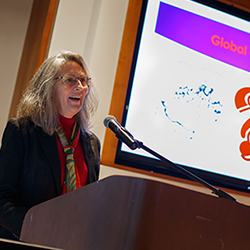
Edward Liu, Xuantong Liu, Sava Berhané and Yuhong Sun.
Simplicity is the key to effective business writing — and it can also be a prize-winning strategy.
In BUS 10a: Functions of the Capitalist Enterprise, an undergraduate business course taught by Sava Berhané, students at Brandeis University learn the strategic importance of writing accurately, persuasively — and above all, efficiently.
“How does what you’re writing help a manager make a decision?” said Berhané, a senior lecturer at Brandeis International Business School. “By stripping away the added flowery language, it can become a vital tool for decision making.”
But if honing your writing chops sounds challenging, imagine doing so in a foreign language. In last year’s BUS 10a class, two-thirds of Berhané’s students were non-native English speakers. This didn’t stop three standout undergrads from winning the university’s J. V. Cunningham Excellence in Writing competition.
Last spring, Edward Liu, Xuantong Liu and Yuhong Sun earned top honors in the social science category for their paper, Sprint Corporation: The Battle for Subscribers. The annual Cunningham awards are open to all Brandeis undergraduates, though only seven students were recognized for their “superbly written” submissions in 2017-18.
“As an international student, I think the award is an approval of our hard work,” said Sun. “It’s also an encouragement for us to work harder in the future.”
Writing is just one component of Berhané’s class. Students also learn about marketing, operations, financial analysis, strategy and organizational behavior.
“The real purpose of the course is to give students a solid foundation in business,” she said. “They also have to be able to communicate what they know, so we introduce some of the major methods of communicating in business.”
Berhané starts with smaller assignments, like writing a memo. But by the end of the course, students are required to submit a 15-page paper analyzing a business event.
“They have to confront a problem facing a real company,” she said. “I ask them to incorporate specific learnings from the course and offer a clear set of carefully analyzed recommendations — and to do all of this while writing well.”
For the award-winning team of Liu, Liu and Sun, this meant applying the “4P” marketing matrix to Sprint Corp., the U.S.-based telecommunications company. “We analyzed Sprint’s product, price, promotion and place,” said Xuantong Liu. “And we gave feasible suggestions based on Sprint’s problems in the four Ps.”
The students incorporated material covered in class, textbook assignments and research they did in the International Business School’s Bloomberg lab. Berhané provided feedback on their initial outline and strategies for improving the structure and content of the paper.
According to the selection committee, the students’ final paper “exemplified the components of exceptional writing, including a unified theme and structure, a focused analysis of the topic, eloquent word choice and the proper use of grammar.”
For Berhané, her informal role as writing coach is especially rewarding. She gets to share her own love of the craft — all while teaching students important skills that they’ll use throughout their professional lives.
“I meet these students so early in their college careers,” she said. “If I’m able to help them understand the value of good writing, it’s just incredible.”
Featured Stories
News Categories
@BrandeisBusiness Instagram
View this profile on InstagramBrandeis Intl. Business School (@brandeisbusiness) • Instagram photos and videos

November 2, 2018
New academic chair honors founding dean
October 9, 2018
Experts discuss trade war and U.S.-China relations
October 5, 2018
Osler cites philosophers in shaping her views on exchange rates
July 10, 2018
A professor with a passion for municipal finance